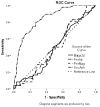Correspondence between psychometric and clinical high risk for psychosis in an undergraduate population
- PMID: 24708081
- PMCID: PMC4152399
- DOI: 10.1037/a0036432
Correspondence between psychometric and clinical high risk for psychosis in an undergraduate population
Abstract
Despite the common use of either psychometric or clinical methods for identifying individuals at risk for psychosis, previous research has not examined the correspondence and extent of convergence of these 2 approaches. Undergraduates (n = 160), selected from a larger pool, completed 3 self-report schizotypy scales: the Magical Ideation Scale, the Perceptual Aberration Scale, and the Revised Social Anhedonia Scale. They were administered the Structured Interview for Prodromal Syndromes. First, high correlations were observed for self-report and interview-rated psychotic-like experiences (rs between .48 and .61, p < .001). Second, 77% of individuals who identified as having a risk for psychosis with the self-report measures reported at least 1 clinically meaningful psychotic-like experience on the Structured Interview for Prodromal Syndromes. Third, receiver operating characteristic curve analyses showed that the self-report scales can be used to identify which participants report clinically meaningful positive symptoms. These results suggest that mostly White undergraduate participants who identify as at risk with the psychometric schizotypy approach report clinically meaningful psychotic-like experiences in an interview format and that the schizotypy scales are moderately to strongly correlated with interview-rated psychotic-like experiences. The results of the current research provide a baseline for comparing research between these 2 approaches.
PsycINFO Database Record (c) 2014 APA, all rights reserved.
Figures


Similar articles
-
Psychotic conversion of individuals at ultra-high risk for psychosis: The potential roles of schizotypy and basic symptoms.Early Interv Psychiatry. 2019 Jun;13(3):546-554. doi: 10.1111/eip.12518. Epub 2017 Dec 8. Early Interv Psychiatry. 2019. PMID: 29218852
-
Dissociative experience in hypothetically psychosis-prone college students.J Nerv Ment Dis. 2000 Aug;188(8):530-6. doi: 10.1097/00005053-200008000-00009. J Nerv Ment Dis. 2000. PMID: 10972573
-
Psychometric properties and validity of short forms of the Wisconsin Schizotypy Scales in two large samples.Schizophr Res. 2012 Feb;134(2-3):267-72. doi: 10.1016/j.schres.2011.11.032. Epub 2011 Dec 19. Schizophr Res. 2012. PMID: 22189258
-
North American Prodrome Longitudinal Study (NAPLS 2): The Prodromal Symptoms.J Nerv Ment Dis. 2015 May;203(5):328-35. doi: 10.1097/NMD.0000000000000290. J Nerv Ment Dis. 2015. PMID: 25919383 Free PMC article.
-
Psychometric high-risk paradigm, perceptual aberrations, and schizotypy: an update.Schizophr Bull. 1994;20(1):121-35. doi: 10.1093/schbul/20.1.121. Schizophr Bull. 1994. PMID: 8197410 Review.
Cited by
-
The Reliability and Validity of Liu´s Self-Report Questionnaire for Screening Putative Pre-Psychotic States (BQSPS) in Adolescents.PLoS One. 2016 Dec 14;11(12):e0167982. doi: 10.1371/journal.pone.0167982. eCollection 2016. PLoS One. 2016. PMID: 27973533 Free PMC article.
-
What you want may not be what you like: A test of the aberrant salience hypothesis in schizophrenia risk.Cogn Affect Behav Neurosci. 2020 Aug;20(4):873-887. doi: 10.3758/s13415-020-00807-3. Cogn Affect Behav Neurosci. 2020. PMID: 32638159
-
Data gathering ability contributes to visual organization and probabilistic reasoning.Heliyon. 2018 Mar 20;4(3):e00582. doi: 10.1016/j.heliyon.2018.e00582. eCollection 2018 Mar. Heliyon. 2018. PMID: 29862345 Free PMC article.
-
Longitudinal and cross-sectional validation of the WERCAP screen for assessing psychosis risk and conversion.Schizophr Res. 2022 Mar;241:201-209. doi: 10.1016/j.schres.2022.01.031. Epub 2022 Feb 7. Schizophr Res. 2022. PMID: 35144059 Free PMC article.
-
Validity and utility of Hierarchical Taxonomy of Psychopathology (HiTOP): I. Psychosis superspectrum.World Psychiatry. 2020 Jun;19(2):151-172. doi: 10.1002/wps.20730. World Psychiatry. 2020. PMID: 32394571 Free PMC article.
References
Publication types
MeSH terms
Grants and funding
LinkOut - more resources
Full Text Sources
Other Literature Sources
Medical

